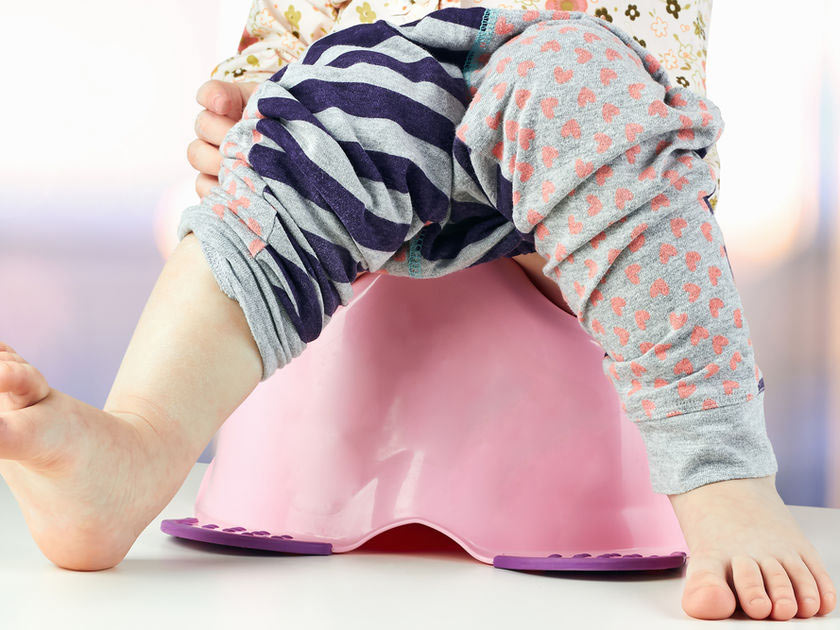The transition from diapers to potty is often not a smooth one. Find out about these common problems that come with toilet training and what you can do about them.
1. Your child doesn't recognize the need to urinate, even though he recognizes the need to move his bowels. This is normal. Some children don't gain complete bladder control for many months after they have learned to control bowel movements. Continue your child's potty training with this in mind.
2. Your child tries to play with the feces. This simply stems from his curiosity. You can prevent this without making him or her feel upset by simply saying, "This is not something to be played with."
3. Your son insists on sitting down to urinate. The majority of boys will want to sit while learning to go in the potty. Let him learn to urinate sitting down and, after he has mastered bladder control, explain to him that boys go potty standing up. He may pick this up on his own if he watches his dad or other male friends or family going to the bathroom.
4. Your child resists going to the potty. Resistance may mean that it's not the right time to start training. When your child seems to need to urinate or have a bowel movement, take him to the potty. Keep your child seated on the potty for only a few minutes at a time. Explain what you want to happen. Be cheerful and casual. If he protests strongly, don't insist.
5. Your child has accidents. Accidents happen. When they do, treat them lightly and try not to get upset. Punishment and scolding will often make children feel bad and may make toilet training take longer.
6. Your child gets upset when she sees her stools flushed away. Some children believe that their wastes are part of their bodies, so this may be frightening and hard for them to understand. Explain the purpose of body wastes and the body's need to eliminate them.
7. Your child is afraid of being sucked into the toilet. Many children fear being sucked into the toilet if it's flushed while they're sitting on it. To give your child a feeling of control, let him or her flush pieces of toilet paper. This will lessen the fear of the sound of rushing water and the sight of things disappearing.
8. Your child has a bowel movement or urinates right after being taken off the toilet. This happens frequently early in the potty training process. It may take time for your child to learn how to relax the muscles that control the bowel and bladder. If this happens a lot, it may mean your child is not really ready for training.
9. Your child asks for a diaper when a bowel movement is expected and stands in a special place to defecate. This indicates that she is physically -- although not emotionally -- ready to be potty trained. Instead of considering this a failure, praise your child for recognizing the bowel signals. Suggest that he or she have the bowel movement in the bathroom while wearing a diaper.
10. Your child urinates while sleeping. Like most children, your own toddler probably will take a little longer to complete nap-time and nighttime toilet training. Encourage your toddler to use the potty immediately before going to bed and as soon as he wakes up. Tell him that if he wakes up in the middle of the night and needs to use the toilet, he can either go by himself or call for you to help him.
11. Your child is only comfortable going to the potty with one particular person. This is normal. If your child will only go potty with you, gradually withdraw yourself from the process. For example, offer to help your child get undressed or walk your child to the bathroom. But wait outside the door.
12. Your child is regressing back to her diaper days. Anything that causes a child stress may encourage her to return to a previous level of development, particularly if the change is recent. Stressors include an illness in the child or a relative, a new baby in the house, a change from crib to bed, or a move to a new house. Give it time and it will pass.
从尿布到便盆的转变通常都不顺利。了解一下这些常见的问题,比如厕所训练,以及你能做些什么。
1、你的孩子不知道需要小便,即使他意识到需要大便。这是正常的。有些孩子在学会控制肠道运动后,几个月都没有完全控制膀胱。继续你孩子的便盆训练,记住这一点。
2、你的孩子想玩粪便。这仅仅源于他的好奇心。你可以在不让他或她感到不安的情况下,简单地说:“这不是要玩的东西。”
3、你儿子坚持要坐下来小便。大多数男孩都想坐着学习去厕所。让他学会坐着小便,在他掌握了膀胱控制之后,向他解释说男孩子们会站起来。如果他看到他的父亲或其他男性朋友或家人去洗手间,他可能会自己选择这个。
4、你的孩子不愿去厕所。抗拒可能意味着现在不是开始训练的时候。当你的孩子似乎需要小便或大便时,带他去厕所。让你的孩子一次坐在便盆上几分钟。解释一下你想要发生什么。开朗、随意。如果他强烈抗议,不要坚持。
5、你的孩子有意外。意外总会发生。当他们这样做的时候,要小心对待他们,尽量不要生气。惩罚和责骂经常会让孩子感觉不好,可能会让他们花更长的时间去上厕所。
6、当你的孩子看到她的大便被冲走时,会感到不安。一些孩子认为他们的排泄物是他们身体的一部分,所以这可能是可怕的,他们很难理解。解释一下身体废物的作用以及身体需要消除它们。
7、你的孩子害怕被吸入马桶。许多孩子害怕被吸进马桶里,如果他们坐在马桶上,就会脸红。为了让你的孩子有一种控制感,让他或她冲洗一下厕纸。这将减轻对流水声和视线消失的恐惧。
8、你的孩子从马桶上下来后马上大便或小便。这种情况经常发生在便盆训练的早期。你的孩子可能需要一些时间来学习如何放松控制肠道和膀胱的肌肉。如果这种情况经常发生,那可能意味着你的孩子还没有准备好接受训练。
9、你的孩子在排便的时候要找尿布,并站在一个特别的地方排便。这表明她身体上——尽管不是情绪上——准备接受便盆训练。不要认为这是一种失败,而是要表扬你的孩子识别肠道信号。建议他或她穿着尿布在浴室里大便。
10、你的孩子在睡觉的时候小便。像大多数孩子一样,你自己的孩子可能需要更长的时间来完成午睡和夜间的厕所训练。鼓励你的孩子在睡觉前和起床后立刻使用便盆。告诉他,如果他半夜醒来需要上厕所,他可以自己去,也可以叫你来帮他。
11、你的孩子只会和一个特定的人一起去厕所。这是正常的。如果你的孩子只和你一起上厕所,那就慢慢地从这个过程中抽身出来。例如,帮助你的孩子脱衣服或者带孩子去洗手间。但是在门外等着。
12、你的孩子正在倒退回尿床的日子。任何导致儿童压力的问题都会促使她恢复到之前的发展水平,特别是在最近发生变化的情况下。压力源包括孩子或亲戚的疾病,家里的新生儿,从婴儿床到床的变化,或者搬到新房子。给它时间,它就会过去。


